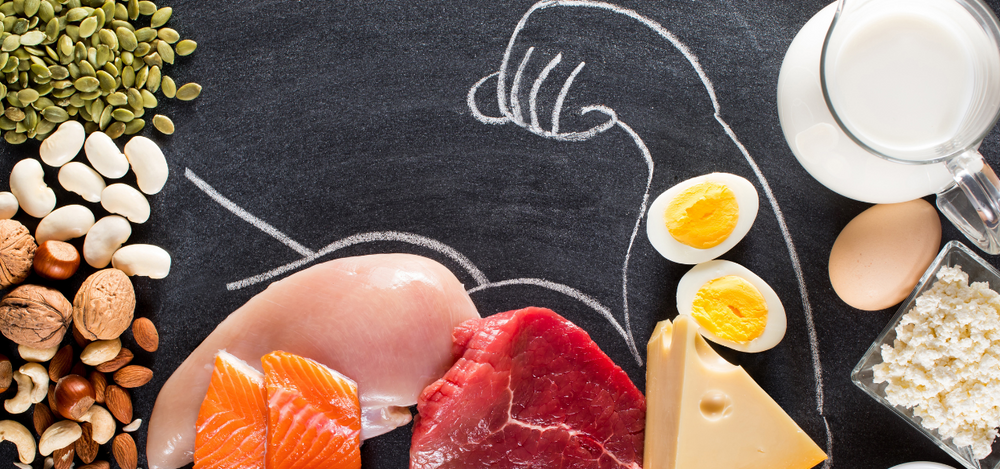How Much Protein Do You Need to Prevent Age-Related Muscle Loss?

To prevent protein deficiency, it’s recommended that adults consume 0.8 grams of protein per kilogram of body weight per day, which is about 50 grams for someone who weighs 140 pounds. As a generalizable shortcut, the Institute of Medicine has provided some average guidelines stating that women need around 46 grams of protein while men need around 56 grams per day.
You can get to those amounts of protein in just one relatively small meal:
- 3.5 ounces of tilapia plus
- 1 cup of cooked quinoa plus
- 2 cups of kale sauteed with lemon juice and 1 ounce of sunflower seeds
But amounts to prevent protein deficiency and amounts needed for optimal health may be different. So is eating even MORE protein helpful, especially for preventing the age-related muscle loss that often comes with getting older?
More Protein Doesn’t Always Mean More Muscle
Recent studies show that while protein is essential for maintaining muscle, increasing intake beyond the recommended daily amount might not offer as much benefit as we’d hoped. In fact, researchers from Harvard randomized older men into two groups: one consuming the recommended 0.8 g/kg of protein per day and another consuming 1.3 g/kg daily. The results? After six months, neither group showed significant improvements in muscle mass, strength, or overall physical performance, even when testosterone was added to the mix. This suggests that extra protein isn’t the magic bullet for muscle enhancement many believe it to be.
A common misconception is that a high-protein diet will automatically build muscle or boost your health. The truth is, your DNA controls how much protein your body actually uses, and without exercise, it won’t signal your muscles to grow. As another proof point, in a study involving older women, muscle mass and physical function did not improve despite daily protein supplementation for 2 years.
What About Protein Utilization Concerns?
As people get older, they tend to eat fewer calories. They also appear to be less efficient in using the protein they consume to build muscle, especially if they fall below a minimum threshold. Studies have shown that this efficiency deficit can be overcome with higher protein intake. So should we be eating more protein as we age because of this alone? Probably. Especially in the context of overall calorie intake.
If our calorie intake is dropping in general, protein intake may diminish concomitantly or even disproportionately. So looking more at percent of calories coming from protein vis a vis other dietary components could be a better guide here. According to nutrition experts the acceptable macronutrient distribution range for protein falls between 10% and 35% of total calories. Aiming for the higher percentage of our calories coming from protein as we age would help maintain a more favorable protein intake overall despite lower calorie consumption - and help overcome the efficiency issues.
The True Key to Maintaining Muscle
Protein is definitely needed for maintaining muscle mass, and we might need slightly more as we age. But the importance of protein intake pales in comparison to the effects of regular exercise! For elderly individuals, resistance training has been shown to be the most effective way to build and maintain muscle, far outweighing any benefits from extra protein consumption.
Are There Any Downsides to Eating More Protein?
Too much of any good thing can be harmful. In fact, a growing body of evidence argues that too much protein can negatively impact longevity, through increased rates of cancer and other chronic diseases. Researchers in the longevity arena would argue for that 0.8 g/kg as the upper limit for protein intake throughout most of our lives, increasing to 1 g/kg after age 65.
Something else to keep in mind: when you eat more protein than your body needs, all those extra amino acids floating around don’t just vanish—they get converted into sugar and even fat. This is why loading up on protein (without cutting calories) won’t necessarily help with weight loss or improve blood sugar control, despite what some might profess.
Don’t Rely on Protein Alone
While protein is important for muscle maintenance, simply increasing your intake won’t necessarily prevent age-related muscle loss or guarantee overall better health. The most reliable way to stay strong as you age is through regular physical activity, especially strength training. So, before you reach for an extra scoop of protein powder, consider focusing on resistance exercises to truly preserve muscle and stay active.
Don’t Over-Complicate It
Obsessively counting protein grams while eating chicken, cottage cheese and chugging protein shakes at every turn is not necessary to achieve optimal protein intake. Getting enough of this macronutrient is easier than you think—it’s in almost everything we eat - including all whole, plant-based foods. In fact, calorie for calorie, broccoli contains slightly more protein than beef! It’s just that you need a small amount of beef and a large amount of broccoli to reach the same calorie load.
And in case you’re concerned that plants are not “complete” sources of protein or that you must eat plants in specific combinations (think rice and beans) to get complete amounts, those myths were debunked years ago.
Honestly, we’re overcomplicating things! The truth is, there’s no hidden secret to optimal health, and it’s not all about protein. If you eat a whole food, plant-centric diet and get enough calories, you’ll get plenty of protein. And if you move your body every day, you’ll maintain (even build) muscle mass. It’s no more complicated than that.

Tested & Proven Results.
- Cardiologist formulated
- Supported by over 500 publications
- Clinically-proven, in a double-blind randomized trial with Mayo Clinic and The University of Manitoba
80% of participants lowered their cholesterol in just 30 days. With just two servings per day, Step One Foods offers a proven-effective way to naturally lower LDL (bad) cholesterol.
Get heart health tips and articles like this, delivered right to your email.
New articles every week.
You may also like...

How Much Protein Do You Need to Prevent Age-Related Muscle Loss?

New Study Links Spirituality to Healthier Blood Pressure and Blood Vessels

You don’t need to avoid foods with cholesterol…except for these


